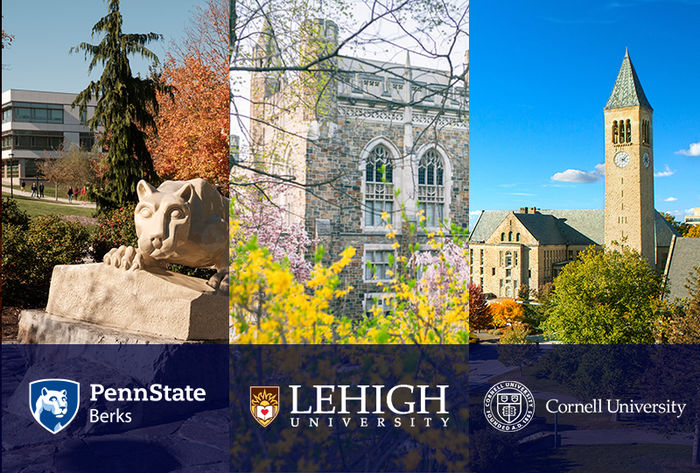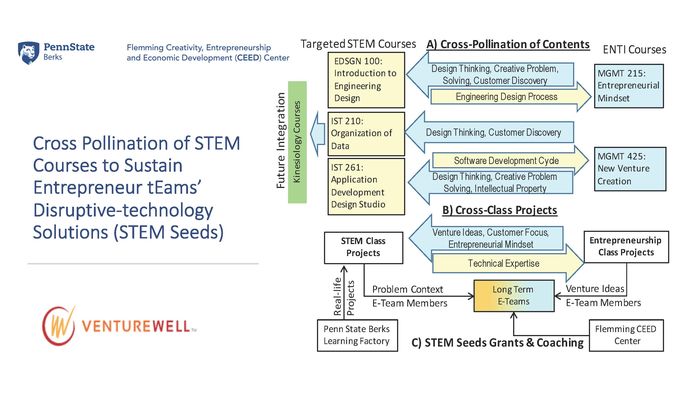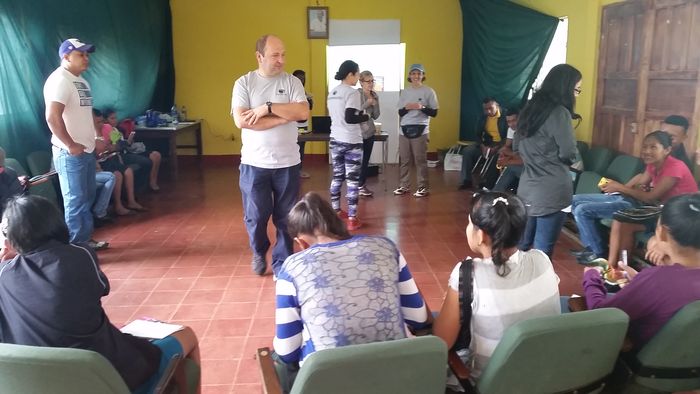Initiatives and Research
NSF funds cultivating innovative thinking skills in STEM Education
The Penn State Berks Flemming Creativity, Entrepreneurship, and Economic Development (CEED) Center is inspiring an entrepreneurial spirit and innovative mindset among students and community members. The Flemming CEED Center has recently been awarded a grant for its proposal titled “Cultivating Innovative Thinking Skills in STEM Education” from the National Science Foundation (NSF). The total amount of the grant is $286,185, and it will be effective from Oct. 15, 2021, to Sept. 30, 2024.
This project -- a collaborative initiative between Penn State Berks, Lehigh University and Cornell University -- aims to serve the national interest by enhancing innovative thinking skills in STEM education, which is important for sustaining the nation’s global leadership in science and engineering.
With increased attention to entrepreneurship and innovation in STEM programs, higher education institutions and foundations have increased their offerings of co-curricular programs, such as design challenges, hackathons, start-up competitions, boot camps, and accelerator programs, to recruit and support student innovators.
The principal investigator is Sadan Kulturel-Konak, professor of management information systems, director of the Flemming CEED Center, and program chair of the entrepreneurship and innovation minor, Penn State Berks. Co-principal investigators include Abdullah Konak, distinguished professor of information sciences and technology, Penn State Berks; Khanjan Mehta, vice provost for creative inquiry and director of the Mountaintop Initiative, Lehigh University; and David Schneider, director of the master of engineering program for systems engineering, Cornell University.
Kulturel-Konak explains “The main hypothesis of the project is that participating in student innovation competitions and challenges (ICCs) is a transformative experience for students as they gain deeper self-awareness of their capabilities in innovation and become more open and critically minded. To answer research questions related to this main hypothesis, the project puts forward a research model that synthesizes the Transformative Learning Theory and Kern Entrepreneurial Engineering Network’s 3Cs (Curiosity, Connections, Creating Value) Framework. The proposed model and its related scales will quantify the extent to which students’ experiences have been transformative in terms of cultivating an innovation mindset. In this sense, the project will be a pioneer in exploring the nexus between a transformative experience and shifts in the innovation mindset.”
According to the project team, the project outcomes will generate new knowledge about how different aspects of ICCs can facilitate transformations in students’ mindsets toward innovation, thereby laying the groundwork to improve ICCs’ potential for building student agency and self-efficacy. Although the project focuses on ICCs, the proposed model and its related scales can also be applied to a broader set of co-curricular and informal learning experiences such as internships, co-ops, undergraduate research, and international exchange programs, which are expected to be transformational for students. Thus, the expected research outcomes can promote fundamental research in other STEM learning environments.
The project’s research activities are organized in the following interconnected research thrusts: capturing students’ experiences in ICCs through interviews; developing the Transformative Learning Scale for the Innovation Mindset (TLSIM) to assess transformations in students’ mindset toward innovation; validating TLSIM in various ICCs and other experiential learning settings; and investigating the relationships among attributes of ICCs, student backgrounds, transformative learning processes, and student outcomes.
For additional information, contact Sadan Kulturel-Konak at sxk70@psu.edu.
About NSF IUSE initiative
The National Science Foundation (NSF) plays a leadership role in developing and implementing efforts to enhance and improve STEM education in the United States. Through the NSF Improving Undergraduate STEM Education (IUSE) initiative, the agency continues to make a substantial commitment to the highest caliber undergraduate STEM education through a Foundation-wide framework of investments. The IUSE: EHR is a core NSF STEM education program that seeks to promote novel, creative, and transformative approaches to generating and using new knowledge about STEM teaching and learning to improve STEM education for undergraduate students.
VentureWell Grant for Creativity
VentureWell’s Faculty Grant, “Cross Pollination of STEM Courses to Sustain Entrepreneur teams’ Disruptive-technology Solutions (STEM Seeds),” was given to a team of Penn State Berks faculty members in the amount of $14,394 for the formation of entrepreneur teams. Their main goal being to increase the number of teams that complete the ideation phase and move onto the testing phase by implementing cross-pollinate introductory engineering and information technology classes with entrepreneurial concepts; cross-class interdisciplinary teams; and enabling students to continue their entrepreneurship projects started in class beyond the end of class time.
Students travel to Nicaragua to teach entrepreneurship
Central America's largest country is rich in natural resources; nonetheless, Nicaragua is the second poorest country in the Western Hemisphere. This paradox typifies the promise and challenges that exist in developing countries and highlights the differences between those nations and developed countries.
While most students were celebrating Thanksgiving with their families and eating too much turkey, a small group of Penn State Berks students traveled to San Jose de Cusmapa, Nicaragua from Nov. 21-29, 2015, with their professors, Dr. Abdullah Konak and Dr. Sadan Kulturel-Konak as part of a social entrepreneurship project. Their destination was Fabretto Cusmapa, a nonprofit organization whose mission is "to empower underserved children and their families to reach their full potential, improve their livelihoods, and take advantage of economic opportunity through education and nutrition."
When asked why Fabretto was selected, Kulturel-Konak explained that Fabretto's mission is synonymous with what the college has been trying to achieve in terms of entrepreneurship and community engagement.
The students were enrolled in the college's Creativity and Innovation Workshop course and the group included LaShawn Crawford and Allie Janowski, both Business majors; Rebecca Jonas, an Information Sciences and Technology major; and Adriana Perez Camacho, a Global Studies major, who also served as an interpreter for the Spanish-speaking group at Fabretto.
"Translating was more than just repeating words in a different language," states Perez Camacho. "It was about transmitting our enthusiasm to the students and communicating the students' gratitude back to our team."
Penn State faculty and students collaborated with Fabretto staff to design the workshop program, which was then taught by Penn State Berks students. The workshop emphasized problem-based learning, creativity, teamwork, and leadership, with a focus on an entrepreneurial mindset.
"One of the highlights of the trip was watching our students learn how to teach," states Kulturel-Konak. "It is such a different experience for them. They saw how much goes into teaching, doing it firsthand."
The Berks students met the Fabretto group, composed of 25 participants ranging in ages from 14 to 28. Despite the language barrier, the group was enthusiastic and excited to meet their visitors. One primary school class they visited had created earrings from pine needles, packaged the earrings, and put price stickers on them. This was an encouraging sign to the Berks students since they were there to teach entrepreneurship.
The workshop began with a focus on creative problem solving, generating ideas, and the concept of entrepreneurship. The Berks students adopted several creative problem-solving activities and examples from the Entrepreneurial Mindset class taught by Konak for the workshop program. When the Berks students asked the group about their concept of entrepreneurship, they had many business ideas. In fact, many of them have already started small projects to better the lives of those in their communities.
Berks students held exercises to teach various entrepreneurship principles. For example, the shortest tower activity, where workshop participants were given wooden blocks to form the shortest tower with only one block touching the floor, stimulated innovation, problem-solving skills, and teamwork. In the shoelace activity, each student was given a shoelace and was asked to tie it using one hand. This activity showed the participants that an idea can pose potential problems for people with physical challenges.
They also introduced the business model canvas and the importance of having a business plan, using local examples such as the business model of Eskimo, a dairy brand that was well known to most of the workshop participants. This led to a discussion in which the Fabretto group shared ideas they were working on for their team projects, including businesses focused on beekeeping, cell phone repair, eco-tourism, and a manicure salon. This information allowed the Berks students to tailor their presentations to the personal interests of the participants.
Other presentations included information on cost structure, revenue streams, income statements, assets, liabilities, and equity. These presentations led to the group building a financial plan, creating a break-even point analysis, and creating a balance sheet.
Finally, the groups put their business model canvases together while the Berks students worked with each team and provided feedback. The cell phone repair team had the winning business plan. The Berks students commented that all the teams' business models improved significantly since the first day of the workshop.
In summary, the Berks students said that when they initially asked the teams to define their customer segments and the values offered to each segment, most teams focused on only one customer segment with limited value offerings. In the last day of the workshop, they expanded over their initial business ideas and came up with new ways to generate revenue. This was the true reflection of an entrepreneurial mindset. travel to Nicaragua to teach entrepreneurship
https://sites.psu.edu/fabretto2015/
Sovereign Center Economic Impact:
2001-02 through 2010-11
by Dr. Lolita Paff, Associate Professor of Business and Economics
This report summarizes the estimated economic impact of the Center's expenditures as well as the spending of visitors to the Center. Read The Economic Impact Report »
Berks awarded a National Collegiate Inventors and Innovators Alliance (NCIIA) Grant,
seeking student participants
Dr. Abdullah Konak, Associate Professor of Information Sciences and Technology at Penn State Berks, has been awarded a grant by the National Collegiate Inventors and Innovators Alliance titled "A Virtual Incubator at Penn State Berks (VIB) to Foster Student Innovations." He is currently seeking interested students to participate in the study. Read more about VIB »
Berks awarded a NCIIA Grant to Internationalize the Entrepreneurship Education
Dr. Janelle Larson, Associate Professor of Agricultural Economics and Division Head for Engineering, Business and Computing, and Dr. Sadan Kulturel-Konak, Associate Professor of Management Information Systems and coordinator of the Entrepreneurship Minor, have been awarded a National Collegiate Inventors and Innovators Alliance (NCIIA) Course and Program grant in the amount of $31,700 for their proposal titled "Internationalizing Entrepreneurship Education Program (IEEP)."
Creative Minds
 Creative Minds Team, comprised of Penn State Berks students and their professor, Dr. Sadan Kulturel-Konak, traveled to Kenya in May 2011 to visit the Children and Youth Empowerment Centre (CYEC), a residential care and education facility for former street-dwelling children. Their mission: to teach the youth at the center a skill that would help to sustain them in the future.
Creative Minds Team, comprised of Penn State Berks students and their professor, Dr. Sadan Kulturel-Konak, traveled to Kenya in May 2011 to visit the Children and Youth Empowerment Centre (CYEC), a residential care and education facility for former street-dwelling children. Their mission: to teach the youth at the center a skill that would help to sustain them in the future.
Electronic waste is a major problem worldwide, including in Kenya. The Creative Minds Team decided to take this surplus waste and use it as a resource. Their goal was to teach the youth at the CYEC to make electronic jewelry from the precious metals, computer components, wires, and plastics contained in the electronic waste and later sell the jewelry, using the profit for future educational advancements. Read more about the Creative Minds Team »
Students won "the most innovative solution award" in the Milking the Rhino Contest. Read the article »


